#james ulster
Text
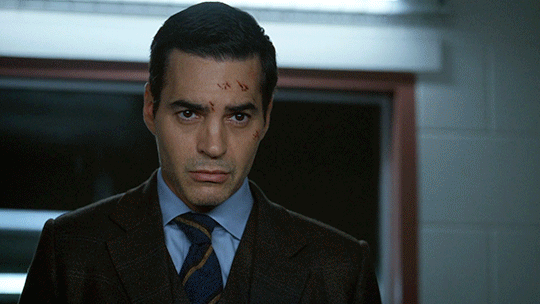
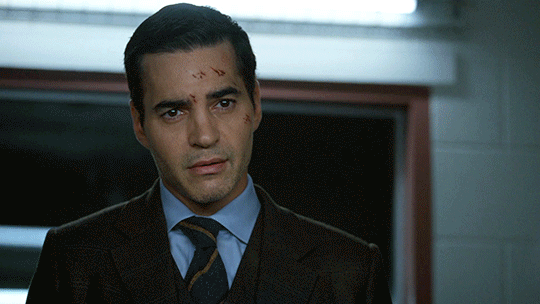

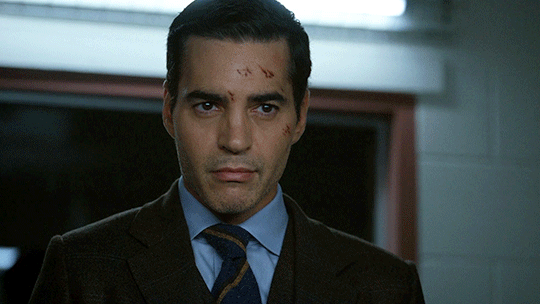
"Tracking down one burner with an inmate population of 2,600 is something you'd only do if you really hate yourself".
#will trent#james ulster#ramon rodriguez#karin slaughter#my gifs#willtrentedits#my edits#mine#season 2#s2#2x02#greg germann#past whump#scratches on face#whump#emotional whump#past injury#peak continuity details#It's the Work I Signed Up For
12 notes
·
View notes
Text
#OTD in 1922 – The IRA kidnaps more than forty loyalists activists and ‘B’ Specials.
In mid-January 1922 the Monaghan football team was arrested in the North on their way to play Derry in the final of the Ulster Championship. On 7 February the IRA responded by kidnapping forty-two prominent loyalists in Fermanagh and Tyrone and held them as hostages. A party of eighteen armed B-Specials, when travelling by train to Enniskillen, were stopped at Clones railway station in Co…

View On WordPress
#Belfast#Clones#Derry#Enniskillen#Fermanagh#History#History of Ireland#IRA#Ireland#Irish Civil War#Irish Free State#Irish History#Irish Republican Army#James Craig#Loyalist Supporters#Michael Collins#Monaghan football team#Neville Chamberlain#Tyrone#Ulster Championship#Winston Churchill
12 notes
·
View notes
Text
An Abbey in Dublin Unearthed
Excavations in Dublin city centre have uncovered the remains of what was once one of Ireland’s most important medieval monasteries. St Mary’s was a House of Benedictines, followed by Savignac monks and then Cistercians, and it was exceedingly wealthy, with the added bonus of being permitted to claim goods from shipwrecks.
At times, it was quite a troubled place–the mayor of Dublin, Robert de…
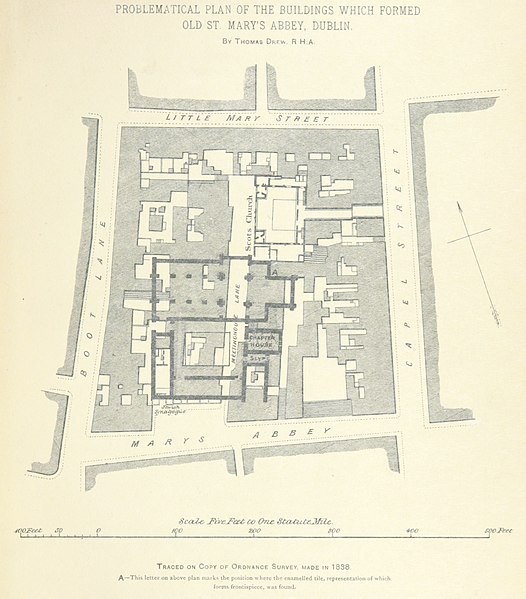
View On WordPress
#Archbishop of Dublin#bigamy#Dissolution of the Monasteries#Dublin#Earls of Ormond#Earls of Ulster#Earls of Wiltshire#Edward Bruce#Edward IV#executions#Henry VIII#Ireland#James Butler#John Earl of Shrewsbury#Lady Eleanor Talbot#Mael Sechnaill mac Maele Ruanaid#pre-contract#Richard Talbot#Robert de Nottingham#St. Mary&039;s Abbey#Towton#Walter Champfleur
0 notes
Text
12th July
The Twelfth
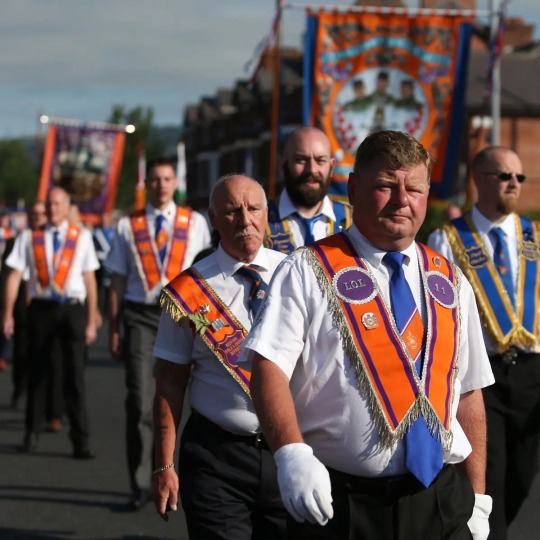
Source: The Guardian
Today is The Twelfth in Ulster and parts of Scotland when the Orange Order, which was founded in 1795, march through towns and cities to commemorate the victory of the Protestant William of Orange over the Catholic King James II at the Battle of Boyne in 1690. The victory ensured the success of the 1688 Glorious Revolution in the United Kingdom and the deposition of James. It also ensured the continuance of the Protestant ascendancy in Ulster and the domination of its Catholic minority which continued at least until the 1999 Good Friday Agreement. As a result, the Orange Order marches have been flashpoints for political tension and sectarian conflict each year.
A slightly more benign commemoration of the Boyne is the Sham Fight which takes place on or about the 12th at Scarva, near Portadown in County Down. Scarva was where William camped the night before the battle and each year after an Orange parade, the battle is re-staged as a fight between two horsemen, one decked out as William and the other as King James. William (known by Ulster Protestants as “King Billy”) of course wins every time.
#orange order#ulster#the twelfth#the battle of the Boyne#king James ii#william of orange#the sham fight#Scarva#King Billy
0 notes
Text
Ireland's Ulster message Andy Farrell ahead of New Zealand tour
Ireland’s Ulster message Andy Farrell ahead of New Zealand tour
Ireland’s Ulster message Andy Farrell ahead of New Zealand tour
John Cooney beat two Irish scrum-half mates up front watching Andy Farrell
Ulster are eyeing a silver medal and while that’s not Dan McFarland’s concern at the moment, their run time might just force Andy Farrell.
Lock Iain Henderson is one of the few Ulster players to regularly make the Six Nations matchday squad, while Mike…

View On WordPress
#All Blacks#Andy Farrell#Dan McFarland#Ireland&039;s Ulster message Andy Farrell ahead of New Zealand tour#James Hume#Mike Lowry#New Zealand#rugby#SPORT#Ulster Rugby#United Rugby Championship
0 notes
Note
Any favourite Irish headcanons for Seamus? 😊
thank you very much for the ask, anon!
and i'm sorry to say that i'm going to be really dull and - before we get into the more insincere headcanons i have for seamus - say that figuring out his role in the series depends on the answer to a really important question which neither the books nor [to my knowledge] jkr's post-series writing addresses:
is wizarding ireland a colony?
as someone who is fond of seeing the series through the lens of anglo-irish history, this preoccupies me a lot - and i think it's something very interesting to unravel...
the statute of secrecy - the law which brings about the separation of the magical and muggle worlds - was first instituted in 1689 and put fully into effect in 1692.
it's reasonably clear from the tone of the extra canonical material that these dates come from [and also from the fact that - i am told - the statute of secrecy is a fairly significant sub-theme of the fantastic beasts films] that jkr landed on these dates for the statute primarily by thinking about the history of witchcraft in early-modern america [the salem witch trials, for example, take place in 1692-1693].
[witch trials were not an exclusively american phenomenon, of course, but they had begun to fade out in early-modern europe by c.1650, which is roughly when they begin to become more widely-documented in the american colonies. it's also fair to say that the pop-culture image of witch trials, even in europe, is heavily influenced by their american manifestation - we've all seen the crucible!]
but selecting this american context to situate the statute within means that - apparently by accident - it's also a document which appears into the lives of british and irish wizards during an extremely bloody time in anglo-irish history...
a detour which has nothing to do with harry potter...
the sixteenth and seventeenth centuries were the main period of british colonial expansion in ireland - the early seventeenth century is, for example, the period of the plantation [that is, the settler colonisation] of ulster [what is now roughly northern ireland].
like many periods of anglo-irish relations, there was a major sectarian aspect to the british treatment of the irish. the plantation was driven by protestant settlers from scotland [which is not and has never been a colony!] and england into northern ireland. the protestant population expanded rapidly in the seventeenth century, political authority in the subordinate irish parliament was largely in the hands of protestant elites [especially clerics connected to the church of ireland] who enacted the policies of the british parliament and the crown, the catholic population was subject to land confiscations, restriction of worship, and an expectation of anglicisation.
and in march of 1689 - the year the statute of secrecy was first signed - this all... rather kicked off.
in november 1688 - in an event known as the glorious revolution - the king of britain [and ireland!], james ii, was forced from the throne. among the reasons for this [many of which were to do with james' absolutist views of monarchy] was the fact that james was a roman catholic, and that the birth of his son james [iii, the old pretender] in june 1688 displaced james ii's protestant daughters mary and anne in the line of succession and would result in a catholic dynasty on the throne. which was unpopular.
so james was chased off and the throne was offered to william of orange - soon to be william iii - the husband of mary [ii].
in an attempt to regain his throne, james primarily recruited support from among the catholic population of ireland [as well as scotland and france], having promised to reverse many of the more unpopular sixteenth- and seventeenth-century policies imposed upon ireland by the crown. this was intolerable both to british and irish protestants, and william iii had no choice but to land in ireland with an army.
the start of the conflict was bloody but nebulous. the tide turned in william iii - and his protestant supporters' - favour in july 1690, with the battle of the boyne, a williamite victory. the jacobite cause was in shambles, james fled the country, and his supporters were eventually made to formally surrender with the signing of the treaty of limerick in october 1691.
from 1691 to 1800, ireland was a british colonial client state [nominally an autonomous kingdom with its own parliament, in reality controlled by the crown and responsible to the king's cabinet in london] politically dominated by anglo-irish protestant families. in 1800, this "independent" legislature was abolished and ireland was absorbed into the united kingdom of britain and ireland and governed from westminster via a colonial administration in dublin, which remained dominated by anglo-irish protestants. this remained the case until the establishment of the republic of ireland in 1922. northern ireland remains a constituent nation of the united kingdom.
and now back to the wizards...
according to the harry potter lexicon [my beloved], jkr has connected the establishment of the statute of secrecy in britain to a delegation of wizards who sought protections for the magical from [a post-battle-of-the-boyne?] william iii and mary ii in 1690. when they failed to get these, the british delegation - along with the representatives from other nations who made up the international confederation of wizards - agreed to the full imposition of the statute, with the main local result of this being the creation of the ministry of magic to govern the magical citizens of britain...
and of ireland?
because something which has always stood out to me - in a way i imagine it has for literally nobody else - is that you can suggest on the basis of canon that magical ireland was never partitioned...
“[England] Went down to Transylvania, three hundred and ninety to ten,” said Charlie gloomily. “Shocking performance. And Wales lost to Uganda, and Scotland was slaughtered by Luxembourg.”
charlie is talking about the performance of the uk's constituent nations in the quidditch world cup here. we know - obviously - that ireland are the finalists and eventual champions of the competition.
northern ireland, however, is nowhere to be seen...
it could be that the northern irish quidditch team is as abysmal at international sport as its muggle equivalents and that charlie regarded it as futile to mention it. it could be that wizarding ireland is a united ireland [slay!]. but it could also be that the minister for magic is ultimately responsible - as the monarch would have been at the time the statute was signed - for the governance of the entirety of ireland, with his rule maintained within ireland itself by a client government which he appoints.
because while i don't buy the idea of a hereditary wizengamot or think that the sacred twenty-eight has any actual power other than the opportunity to influence the minister... it's striking that the name of an anglo-irish noble family appears on it [burke - although carrow is sufficiently close to the anglo-irish "carew" for us to consider it a variant, and one also finds the odd lestrange knocking about irish history...], and that jkr has written about another of the most prominent pureblood families as having been resident in ireland during the seventeenth century... the gaunts [it's why lord voldemort like relics so much...]. we also know that the london edition of the daily prophet - which functions as something close to state propaganda - circulates in ireland, because seamus' mother takes it, and that the ministry is unhappy with the tricolour flag being flown ostentatiously by ireland supporters during the world cup...
it is, then, entirely possible - should an author wish - to imagine that the imposition of the statute at such a key point in anglo-irish history means that the magical ireland of the 1990s remains subject to the british minister, and that it therefore has a very different political and cultural relationship to britain than its muggle cousin.
and i also think that this but one way of thinking more broadly about the wider imperialist vibe which is found in the books: the defence of "civilisation" and the status quo; the fact that so much "wizarding" culture is just posh british stuff; the fact that so many of the historical analogies jkr uses to mirror wizarding history relate to the troubles; the ways in which the size and insularity of the wizarding population means that the conditions which enable revolution might not be present in magical communities, etc.
and for us to think about the ways this might make wizarding history diverge from muggle in the early-modern and modern era: is there a revolution in wizarding russia, or are there still estates staffed by squib serfs? do wizards think they're travelling to istanbul or constantinople? do wizards participate in the "new imperialism" of the late nineteenth century, imposing the same colonial borders upon magical africa and asia as muggles do? what would it be like, if you were muggleborn, entering a world which is not only so culturally and politically different, but geographically different?
which brings us to...
seamus finnegan headcanons
on the basis of name alone - which, of course, doesn't mean everything - seamus appears to be one of the only students of irish extraction [that is, not just the only student who's an irish national, but the only student who's of irish heritage] at hogwarts [orla quirke - sorted in goblet of fire - is the only other one i can think of].
[although it is worth noting that many names which appear to be scottish are also common in ireland - especially in the north. professor mcgonagall has - on the information of the seven-book canon - just as much chance of being an ulster protestant as she does a scot...]
[i have decided on the basis of this that i now think cormac mclaggen is northern irish.]
irish people from all walks of life live, study, and work in britain - and vice versa. but the fact that seamus attends a boarding school with the specific cultural vibe hogwarts has - that is, an institution which is a pastiche of elite, fee-paying british schools; which directly maintains the class-based status quo which props up the wizarding state; whose graduates dominate high-level political and institutional positions; and whose student body is strikingly well-heeled - suggests that there are less famous wizarding schools in ireland, and that him being sent to hogwarts is the result of a certain anglophilia [and the desire for him to benefit in any future ministry career, in britain or ireland, from an elite british education] on behalf of his parents...
this is not to say that i think seamus is a protestant - although i genuinely think that the muggle dad witch mam thing is meant to be a joke suggesting he comes from a mixed marriage [still reasonably scandalous here even in 2024!] - but that he comes from a reasonably posh, anglophile, unionist catholic background, as did many real anglo-irish civil servants educated at the sort of institutions - especially oxford and cambridge - hogwarts shares a cultural vibe with.
but who gives a shit about class and religion! the more important things to know about seamus:
his go-to chip shop order is - as it should be - a spice bag.
he has - in his life - drunk the odd bottle of football special.
his over-the-top loathing of "pretty-boy diggory" in goblet of fire is an absolutely iconic deflection tactic from the fact he's gay - and deamus is canon.
indeed, he loves dean so much that he has willingly cheered for the england national football team [although he threatened to obliviate anybody dean told about this]. dean, for his part, has got really into hurling.
the closest they come to divorce is when dean won't stop singing galway girl by ed sheeran at him.
one @whinlatter has convinced me of: this is their son.
his confirmation name is florian - the patron saint of protection against fire.
him getting beaten to a pulp by the carrows - and then explaining in great detail how the room of requirement works to harry - is iconic, and is a really under-appreciated aspect of character growth from his doubt over harry in order of the phoenix.
the derry girl he identifies most strongly with is james - although he tells everyone it's michelle.
he met edele lynch from b*witched once and lost his mind.
he owns a flat cap.
him publicly beefing with his mam in the immediate run-up to dumbledore's funeral is one of the most specifically irish things he ever does and i can't explain why.
him giving harry an "appreciative smirk" after he drops the iconic "there's no need to call me sir, professor" line is the second most irish thing he does. i, once again, cannot explain why. [him winking at harry after he answers snape back in their very first potions lesson also sends me.]
he is the voice behind this iconic video... and, let's be real, his slight capacity for self-aggrandisement and sulking does make him a plausible cork man.
he visits his granny every sunday for endless cups of tea and re-runs of ballykissangel.
he has never read a single piece of writing by sally rooney - but he lies and says he has.
he did this to harry on his first day in the ministry:
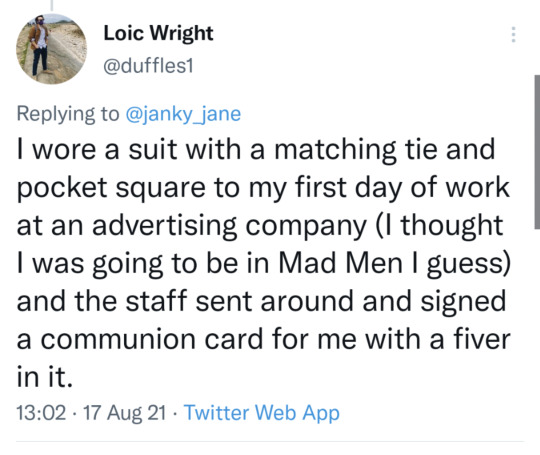
his wand is made of dogwood - which suits the flamboyant and loud.
he's shown in canon to quite like a bit of gossip - him being gassed up by quirrell's claim that he fought a zombie and then gutted when quirrell refuses to actually tell the story always sends me - and i like the idea of him being amazing value in a pub.
he's an only child - but he has at least thirty cousins. and his cousin fergus genuinely never did have another peaceful moment after seamus learned to apparate.
he and lavender went to the yule ball together because both dean and parvati are stupid and didn't see what was right in front of their faces. they split a bottle of archers behind a rose bush and complained about men and it was the best night of their lives.
he goes as red as a lobster the second the sun's out.
he runs the shit london guinness twitter account.
his boggart is a banshee because his dad - who is literally only mentioned once in philosopher's stone - dies over the summer before his second year [banshees - in irish folklore - herald the deaths of family members with their weeping]. however - unlike harry - you don't hear him fucking banging on about this all the time...
and he can't speak a word of irish, but none of the posh english lads he knows are going to risk calling him out on that...
#asks answered#asenora meta#seamus finnigan#northern ireland posting#republic of ireland posting#the fact that she didn't think *once* about the fact the ministry of magic is technically established by king billy...#joanne come on noyyyyy#dumbledore was in the apprentice boys i fear#that's why fawkes is orange#literally just checked the lexicon to see if anything significant happened on the twelfth...
48 notes
·
View notes
Text
There's a surprising anachronism in Blue Eye Samurai. The showrunners' research on seventeenth-century Japan is impeccable, but they've made a mistake in their seventeenth-century Irish history.
There is NO WAY someone named 'Abijah Fowler' could have suffered as a child during the Nine Years' War (1593-1603). Abijah is an obscure Old Testament name, not Irish; Fowler is thoroughly English. The Nine Years' War was largely fought in Ulster. The Ulster Plantation, which saw the mass transfer of English and Scottish settlers to northern Ireland, didn't take place until the reign of James I, well after the war had concluded.
Furthermore, even if Fowler HAD grown up, as an English child, in Gaelic Ulster, it is extremely unlikely that he would have suffered as he said he did in episode 8. Any settlers in Ireland at the time were very wealthy, highly influential, and loyal to the Crown. They were the ones doing the burning and spoiling, not dying from it. If food did run low, they would have been able to escape back to England/Scotland.
Of course, there's always the possibility that Fowler is lying and inventing a tragic backstory for himself, which would be very interesting and quite clever.
80 notes
·
View notes
Text

James Maitland Stewart, here October 1934, was born on May 20, 1908, in Indiana, Pennsylvania, to Elizabeth Ruth (Johnson) and Alexander Maitland Stewart, who owned a hardware store. He was of Scottish, Ulster-Scots, and some English descent.
45 notes
·
View notes
Text

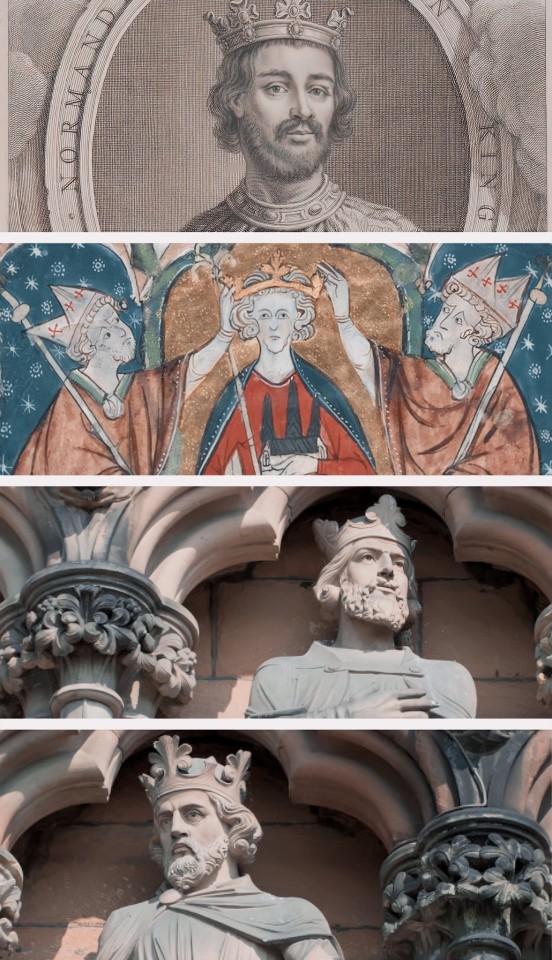
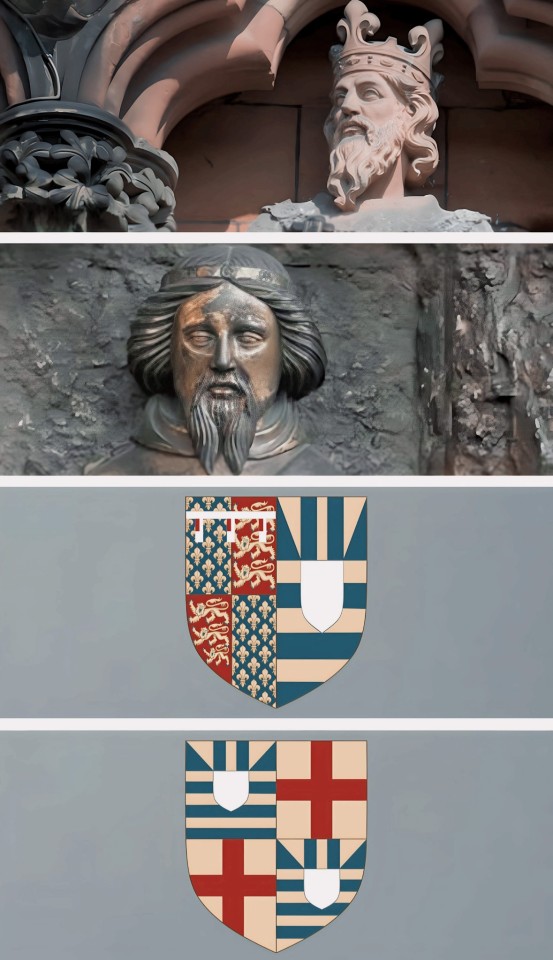
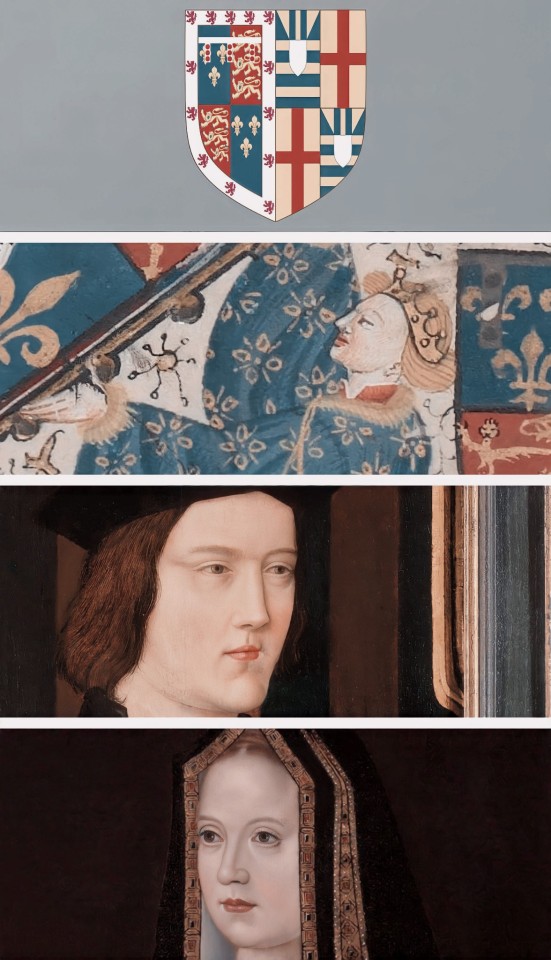
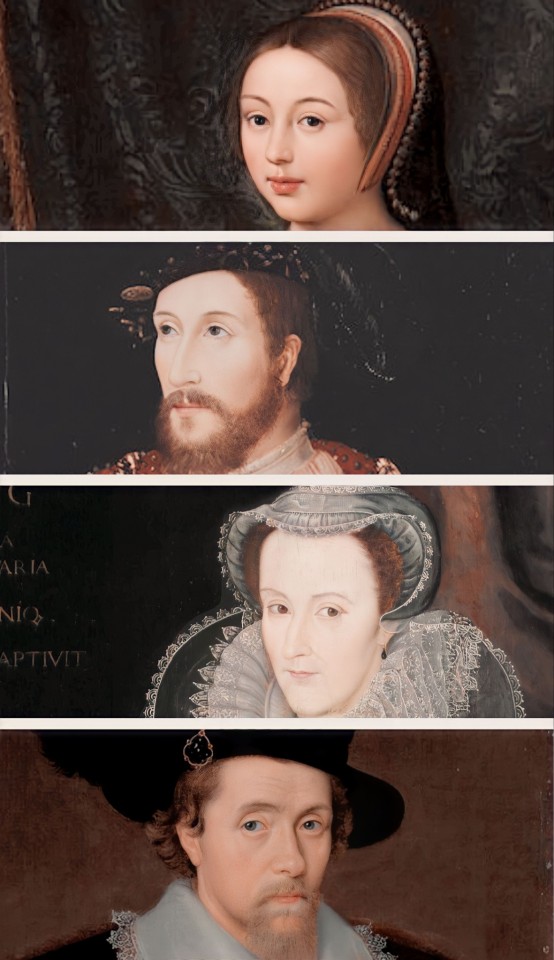
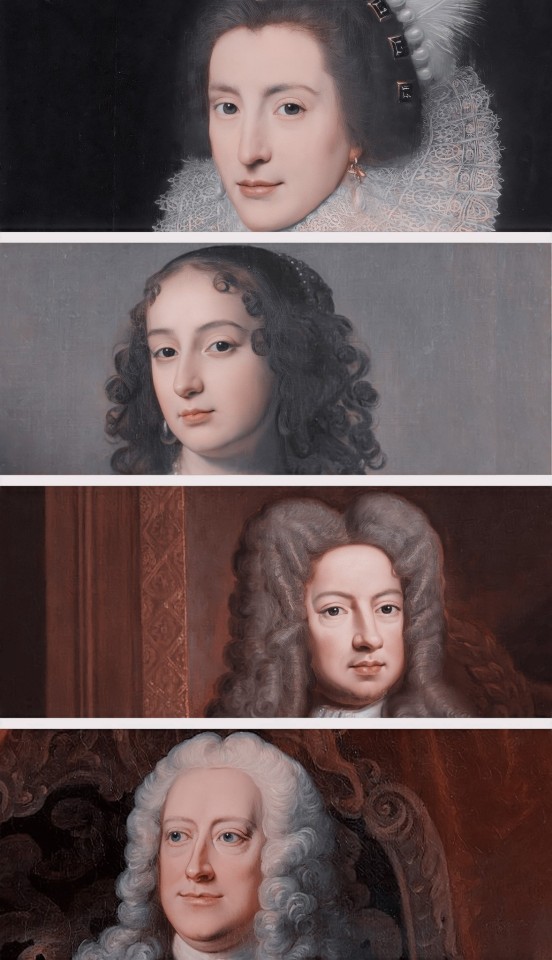
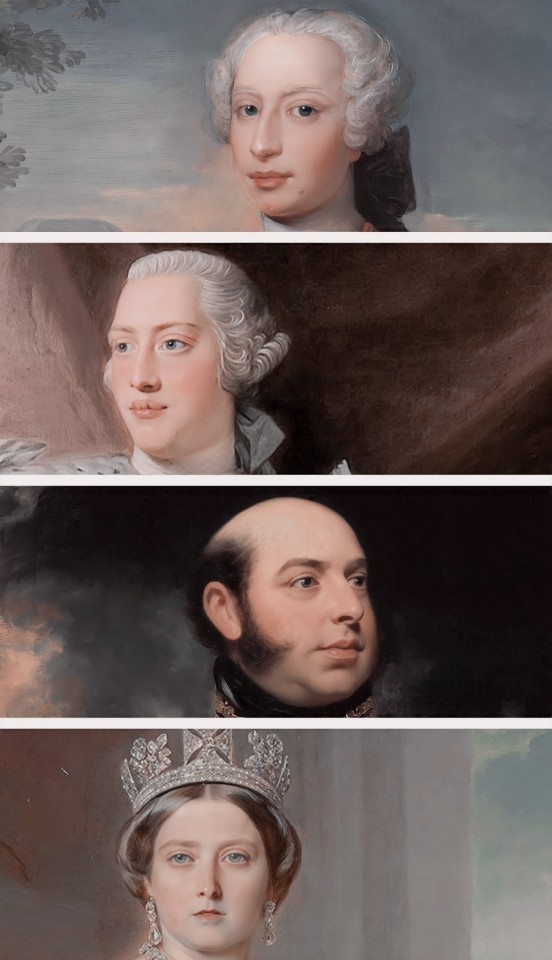

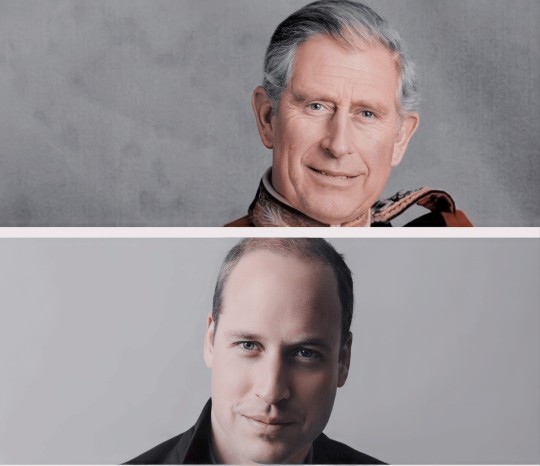
⋆ William, The Conqueror to William, The Prince of Wales ⋆
⤜ The Prince of Wales is William I's 24th Great-Grandson via his paternal grandmother's line.
William I of England
Henry I of England
Empress Matilda
Henry II of England
John of England
Henry III of England
Edward I of England
Edward II of England
Edward III of England
Lionel of Antwerp, Ist Duke of Clarence
Philippa Plantagenet, Vth Countess of Ulster
Roger Mortimer, IVth Earl of March
Anne Mortimer
Richard Plantagenet, IIIrd Duke of York
Edward IV of England
Elizabeth of York
Margaret Tudor
James V of Scotland
Mary Stewart, Queen of Scotland
James I of England
Elizabeth Stuart, Queen of Bohemia
Sophia, Electress of Hanover
George I of Great Britain
George II of Great Britain
Frederick, Prince of Wales
George III of the United Kingdom
Prince Edward Augustus, Duke of Kent and Strathearn
Victoria of the United Kingdom
Edward VII of the United Kingdom
George V of the United Kingdom
George VI of the United Kingdom
Elizabeth II of the United Kingdom
Charles III of the United Kingdom
William, The Prince of Wales
#royal line from william i#the british royal line#british royal family#british royals#royalty#royals#british royalty#brf#royal#royalty edit#mine.#historical royals#prince william#prince of wales#the prince of wales#william the conqueror#king edward iv#the plantagenets#house of york#house of plantagenet#house of tudor#house of stewart#house of stuart#king charles#king charles iii#queen elizabeth ii#queen victoria#house of normandy#mary queen of scots
168 notes
·
View notes
Text
here's a list of cool PDFs I have saved on my drive that I thought other people might like too:
"Cleaning Bones" by Stephen P. Nawrocki, PhD, University of Indianapolis Archeology & Forensics Laboratory
"Cultural Appropriation in Contemporary Neopaganism and Witchcraft" by Kathryn Gottlieb, University of Maine
"The Voyage of Bran (Imram Brain)" translated by Kuno Meyer
"Duanaire Fionn (The Book of the Lays of Finn)" Cumann na Scríbheann nGaedhilge/Irish Texts Society
"Early Gaelic Dress" by Scott Barrett
"The Voyage of St. Brenden: Celtic Otherworld Tale, Christian Apologia, or Medieval Travelog?" by James E. Doan
"Is Deithbir Disi [it is appropriate (that she would behave in this way)]: Applying the Lens of Gender Parody to Medb in the Old Irish Ulster Cycle" by Diana Veronica Dominguez
"A Discussion of the Magical Attributes of the Hero in Fenian Literature, with specific reference to the tale 'The Pursuit of Diarmuid and Gráinne'" by Oliver Gerler, University of Limerick, IE
"The Plain of Blood; a Study of the Ritual Landscape of Magh Slecht, Co. Cavan" by Kevin White
"The Iona Chronicle, the Descendants of Áedan mac Gabráin, and the 'Principal Kindreds of Dál Riata'" by James E. Fraser
Issue of "An tÓglach" magazine, vol. IV no. 12, with a detailed article about Cumann na mBan's efforts during the week of the Easter Rising written by Nora O'Daly
"Gaeilge Gan Stró! Beginners Level" by Éamonn Ó Dónaill
1K notes
·
View notes
Text
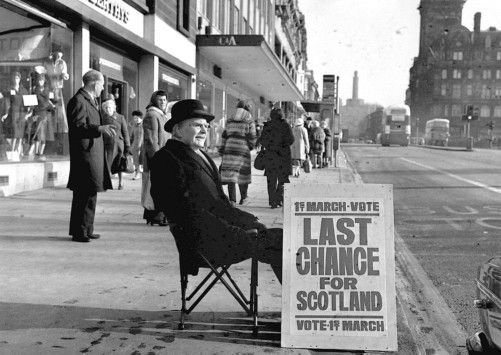
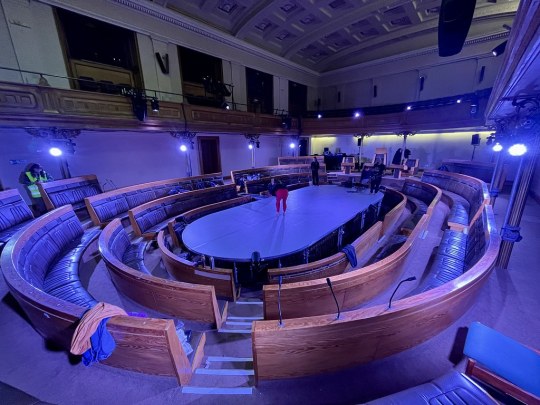
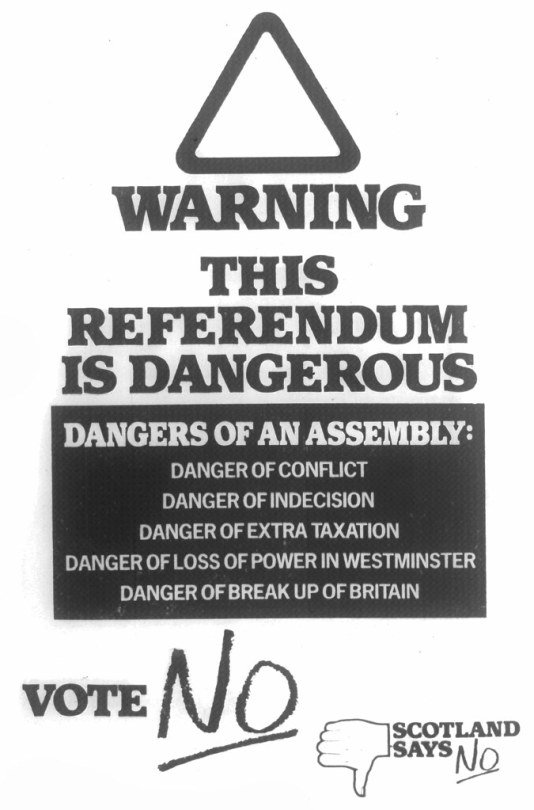
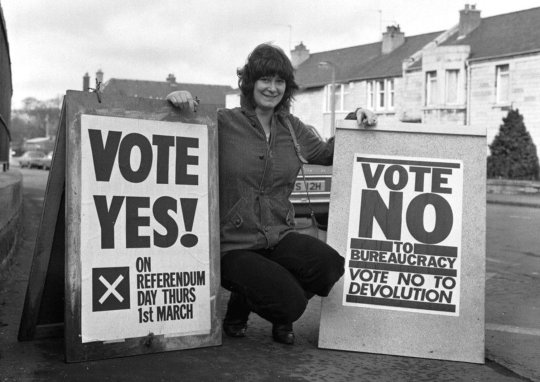
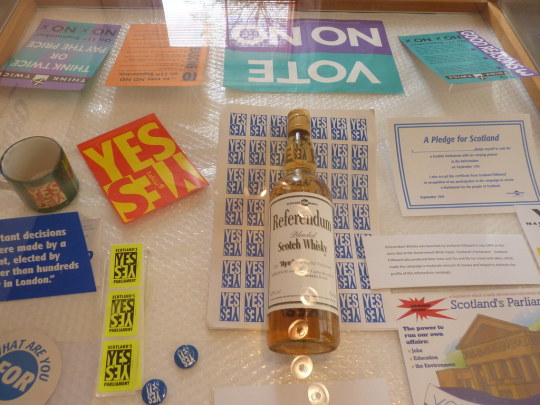

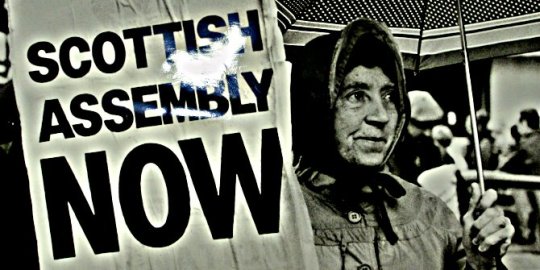
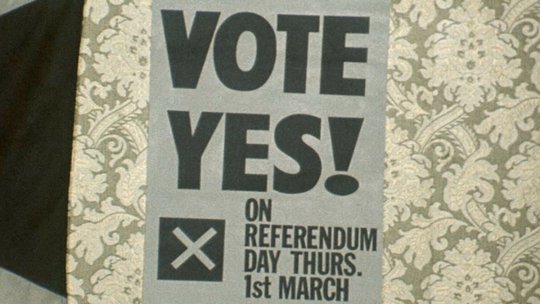
On March 1st 1979 Scots voted in favour of Devolution, but failed to reach the required 40% of the population in favour of implementing it - due to 36% of the electorate not voting.
THE PLOT.
The introduction of devolution legislation in 1976 was largely the product of nationalist pressures on the Government. James Callaghan's Labour government had a majority of only three after the 1974 (October) election and by 1977 had no majority at all after a series of by-election defeats. The government was therefore vulnerable to pressures from the Scottish National Party and Plaid Cymru, who between them won 14 seats at the election (SNP 11, Plaid Cymru 3). The Kilbrandon commission had reported in 1974, recommending the establishment of a Scottish parliament and endorsing the principle of devolution.
A combined Scotland and Wales Bill was introduced in November 1976. It gained a second reading only after referendums in both Scotland and Wales had been conceded. The Shadow Secretary of State for Scotland, Alick Buchanan-Smith, and one of his front benchers, Malcolm Rifkind, resigned their posts when the Shadow Cabinet decided to oppose its second reading. On the first day of committee 350 amendments were put down. Michael Foot, (then Lord President and Cabinet Minister responsible for the devolution bill) was reluctant to impose a guillotine. After nearly 100 hours of debate only three and a half clauses of the bill had been considered. A guillotine motion was tabled but defeated in February 1977. The Bill was withdrawn.
In November 1977 separate Bills for Scotland and Wales were introduced, with support from the Liberals. This reduced opposition from those who had previously opposed the combined Bill on the grounds that the Welsh did not really want devolution. This time the guillotine motion was won.
As the committee stage was nearing its end, it scrutinised an amendment from Labour backbencher George Cunningham. It required the Secretary of State to lay before Parliament an order repealing the Act unless at least 40% of the eligible electorate voted "yes". The amendment was strongly opposed by the Government, but they lost the vote by 166 votes to 151.
In the referendum, on 1st March 1979, Scotland voted in favour of devolution by 52% to 48% - but only 32.9% of the electorate had joined the majority. In Wales the vote was against devolution, by 80% to 20%. The Acts were repealed the next month.
The Government was not helped by the extent of internal dissent within the Labour party. There was an active Labour 'Vote No' campaign in Scotland, of which Brian Wilson was Chairman, and Robin Cook a Vice-Chairman together with Tam Dalyell.
In Wales, Neil Kinnock was among those who campaigned for a "no" vote. During the last few days of the campaign in Wales, the pro-devolution Labour party -TUC group argued that a "No" vote would be a vote for the Tories, and a vote against the Government. This was a gamble that did not pay off; the scale of the "No" victory meant that those who had campaigned against the government could feel vindicated.
A motion of no confidence in the government was tabled by the Conservatives and supported by the SNP, the Liberals and eight Ulster Unionists. This motion was carried by one vote on 28th March 1979. The next day Callaghan announced that Parliament would be dissolved.
The 1979 Results:
Scotland: Question: Do you want the provisions of the Scotland Act 1978 to be put into effect ?
Yes 1,230,937 (51.6%)
No 1,153, 502 (48.4%)
Rejected ballot papers 3,133
Electorate 3, 747,112
Turnout 63.6%
But, we Scots are known the world over for this saying. Try, try and try again we did and won our parliament. We did and we put the party in powder who would take us to freedom. We will never give up our fight to be an Independent country once more.
19 notes
·
View notes
Text
After the defeat of the Ottoman Empire in World War I, Britain was given administrative control over the area then known as Palestine. Britain’s foreign secretary at the time, Arthur James Balfour — who was previously Britain’s chief secretary for Ireland, and known for his sometimes brutal suppression of Irish demands for independence — had laid out his country’s support for “the establishment in Palestine of a national home for the Jewish people” in the Balfour Declaration of 1917.
[...]
British officials have drawn their own parallels between the Irish and the Palestinians. Ronald Storrs, who was governor of Jerusalem from 1917 to 1926, wrote in his memoir that if enough Jewish people moved to Palestine, it could “form for England a ��little loyal Jewish Ulster’ in a sea of potentially hostile Arabism” — a reference to English settlers who were sent to Northern Ireland in what became known as the “plantation of Ulster.”
– Tracing the Deep Roots of Ireland’s Support for Palestinians, Megan Specia
14 notes
·
View notes
Text
#OTD in 1641 – Rory O’More, Lord Maguire and Sir Pheilim O’Neill initiate a major revolt in Armagh.
The Irish Uprising of 1641 was a long-term result of the “plantation” policy of Tudor and Stuart monarchs under which Ireland was aggressively colonised by Protestant settlers from England and Scotland.
From the mid-16th century, Irish landowners were dispossessed to make way for the settlers and a vicious cycle developed whereby rebellion against the English government was followed by further…
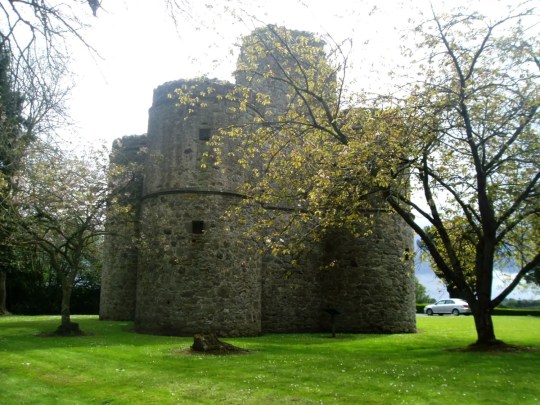
View On WordPress
#Catholic Conspiracy#Charlemont#Co. Armagh#Dungannon#Earl of Tyrone#England#Hugh MacMahon#Hugh O’Neill#Irish Uprising of 1641#King James I#Leinster#Lord Lieutenant of Ireland#Mountjoy#Oliver Cromwell#Plantation of Ulster#Portadown#Protestant#Rory O&039;More#Sir William Parsons#Ulster
10 notes
·
View notes
Text
Nikolaj Coster-Waldau has eight seasons of faux Medieval cred thanks to his character Jaime Lannister on Game of Thrones. In an upcoming production by the BBC and CBS Studios he gets to recreate some actual 11th century history in the series King and Conqueror.
Nikolaj's character never got to rule the Seven Kingdoms. But in King and Conqueror he portrays William the Conqueror who became King of England and ultimately the founder of the royal line which still reigns in London.
George R.R. Martin was heavily influenced by English, French, and Scottish history in ASoIaF. GRRM may have had William the Conqueror in mind when writing about Aegon I Targaryen.
In 1066, the English King Edward the Confessor died without an heir. As if dying without a direct descendant to claim the throne wasn't one of the most chaotic things a king could do, Edward took it a step further: He allegedly promised the throne to both his brother-in-law, Harold Godwinson, and to a distant relative, William of Normandy.
Harold and William weren't the only ones with a claim, either. While the pope endorsed William's claim, the resulting war of succession would force Harold to fight Harald Hardrada, the king of Norway, who also claimed the thrones of Denmark and England and invaded the latter alongside Harold's brother, Tostig. Anglo-Saxon King Harold would have to defeat Harald before meeting William and his Norman invasion at the Battle of Hastings, all in the same year.
If that sounds to you like a lot of drama that could easily be its own television series, you aren't alone. CBS Studios and the BBC are teaming to produce "King and Conqueror," a show about this most pivotal event in English history. James Norton ("Happy Valley") and Nikolaj Coster-Waldau ("Game of Thrones") are attached to be the titular King Harold and William the Conqueror, respectively.
[ ... ]
Historians might disagree on whose side of the story is more accurate, but screenwriters and producers agree that no matter what happened, the 1,000-year-old story will make for great television. Michael Robert Johnson ("Sherlock Holmes") will pen the series while Baltasar Kormákur ("2 Guns") will direct.
"King and Conqueror" begins production in 2024.
There's actually a physical artistic link between the account of William's conquest in the 1060s and Game of Thrones.
After William's victory, his half-brother Bishop Odo was apparently the commissioner of a tapestry embroidered with scenes which tell the epic story of William's conquest. The cloth, now known as the Bayeaux Tapestry is an amazing 70 meters long. It can be viewed here.
So volunteers at the Ulster Museum in Northern Ireland where GoT was produced created a tapestry in the style of the Bayeaux Tapestry which tells the story of all eight seasons of GoT. See our 2019 post about it.
#game of thrones#house of the dragon#nikolaj coster-waldau#jaime lannister#william the conqueror#king and conqueror#bayeaux tapestry#guillaume le conquérant#gra o tron#trône de fer#kampen om jerntronen#pemainan takhta#a guerra dos tronos#juego de tronos#trono di spade#taht oyunları#trò chơi của ngai#valtaistuinpeli#hra o trůny#isang kanta ng yelo at apoy#гра престолів#왕좌의 게임#权力的游戏#ゲームの玉座#صراع العروش#تخت کے کھیل#गेम ऑफ़ थ्रोन्स#গেম অব থ্রোনস#ಗೇಮ್ ಆಫ್ ಥ್ರೋನ್ಸ್#игра престолов
15 notes
·
View notes
Text
@epersonae :D

Infodumping time! :D :D :D :D
Okay, so it has been acknowledged on all fronts that OFMD does really well at dealing with a world steeped in colonialism, especially when it comes to Ed and his mum’s implicit backstory, Jim’s history and family background in St. Augustine, plus the various tidbits we get about Frenchie, Oluwande and Roach and the other one-episode characters like Abshir and the Arawak people.
Now let me explain why I also got so excited about the British characters we have in the show, entirely based in the context of colonialism and the British class system.
The show is set in 1717. By this point, Britain is the ‘united’ Kingdom with England having laid claim to Ireland and Wales for years and finally hooking Scotland with the Act of Union in 1707, after the disaster of the Darien Project - another story another day - utterly bankrupted Scotland.
In 1689, there was the Glorious Revolution, wherein William of Orange came over from the Netherlands (at the request of the mostly English aristocracy) and punted James II/VII (II of England, VII of Scotland) off the throne. Civil wars of various shapes and sizes happened for the next 40+ years, but especially in parts of Ireland and Scotland.
So let me tell you that when I realised this crew of pirates had both a Northern Irish and a working class Scots character in it? I screeched. Especially a Scots character using the Scots language, which never appears anywhere except Scots media? Not least because many, many pirates who were working in the Caribbean at that time were dispossessed Irish and Scotsmen, especially following the most recent Jacobite rising in 1715. (Also, speculation abounds that historical Stede was actually a Jacobite sympathiser since he named his second ship Royal James, but that’s another story for another day)
I’m not as familiar with the Irish history, but I know that with the plantation of Ulster in the 17th century, Irish Catholic families were forcibly displaced to make room for Protestant families from Britain, who got all the valuable/usable land, while the Irish Catholic population were taxed to the hilt and driven to live on poorer land plus the horrors of the church schooling system, where the kids were taken from their families to be assimilated.
Sound familiar? Ireland is where Britain honed its colonisation blade to the point that in 1745, the Scots nobles were calling it “the Irish system” when they decided it would be a useful thing to use to subdue “the superstitious savages” in the Highlands to turn everyone into only-English-speaking protestant automatons (Again, Buttons speaking Scots had me screeching! It doesn’t happen! Not in American shows! And yet!!!). It was later rolled out across the British empire.
So yes. This has been happening for centuries and one of the regular solutions to deal with people who were protesting against children being taken/all their food being taxed away/any vague sound of dissent or rumblings of ‘Papishness’ was cause for Banishment. The Good Old British solution to any problem in the 16th-18th century: kick them out the country to one of the countries that we need filled with white folk or enslave them in a plantation.
It’s very telling that in British politics, the insults that the London-based politicians used for each other were to call each other Irish bandits (Tory is apparently an English bastardisation of the Irish word “tóraidhe”, which means outlaw) and Scottish cow herder (likewise Whig was mockingly derived from “Chuig an bothar”, the call of the cattle drivers)
So within a historical context, Buttons and Wee John ending up in the Caribbean wouldn’t have been unusual. It was very common to the point that there was an entire Jacobite/anti-England faction of pirates in Nassau (ie. the Republic of Pirates). There’s also a reason that a lot of plantations ended up being owned by Scottish ex-aristocracy - many were stripped of lands/titles because of the Jacobite risings and ended up in the Caribbean (And made their fortunes, then bribed their way back to their titles because of course they did. Bastards).
I do wish we’d got more information about Ivan and his background. At the time the show is set, Britain was tromping over and around south Asia with the East Indian Trading Company (also known as the Giant Company of Thieving Bastards Here To Steal Your Cool Stuff) which had been spreading its influence throughout the region since the 1600s and by the 1700s, were the main European power in the area. There are records showing connections between south Asia and St. Helena in the Caribbean from as early as 1684, so it isn’t impossible that someone from the area that is now Pakistan couldn’t have ended up working on trading ships to the Caribbean.
And then we have Lucius and Izzy, our two white English crew.
I have so many feelings about the class subtext that is slathered all over the show and I need to mention that before I move on to the boys.
Stede is technically upper class because of his wealth but when you see him with any of the other English characters who are upper class by birth and breeding, he is seen as secondary to them. The way Badminton and his officers treat Stede demonstrates this. If he was the firstborn son of someone with any title/lineage and had inherited said title, there would be some level of class-bias and respect shown because one has to follow the social code. However, the son of a man who bought his way into land and respectability? PFFT. No.
When his father says “Mary has acreage” and tells Stede “you didn’t earn it”, it speaks measures: Bonnet Senior is new money with no property or title and is still angry about “rich boys”. He’s rich himself, yes, but he wasn’t born to it. He didn’t inherit it and he begrudges the fact his son will have it handed to him. (Take Antoinette’s comment to Siegfried on the party ship - “just inherit it like a normal person” - this is how the gentry talk about wealth)
Also, re. Stede not having an English accent, while his father does - I like the implication that Stede is first-gen colony baby. His dad came out to make a fortune, which is why he still has his English accent, but Stede was only in England for school, which is why he doesn’t have the accent.
So yis, in that line, Stede is upper class by property, but not by breeding. He’s “not some derelict. He has money” and that’s all that he had going for him. When he talks about the party he describes it as “posh knobs hob-nobbing with other posh nobs” and later tells Frenchie he never really fit in at those kind of dos. His father may be a land-owner, but that’s only a few steps above “tradesman” to the born-and-raised aristocracy.
Then we have Lucius. He’s absolutely not working class. At a guess, I’d say some kind of merchant level because his family would have had to be financially sound enough to afford to give him an education that involved calligraphy and have a reason for him to be able to read and write exceptionally well. One of the options is that he was trained up to be a clerk, someone who does all the writing and book-keeping.
And then we have Izzy. I can’t avoid the fact that Izzy’s social context is important because Con is famous in his field for playing working class northern characters. He’s won awards for it.
Before I start munching on this particular chew toy, a quick recap: for people unfamiliar with the British Isles, there is a big social divide between the north and south of England. North England was where so much of the big industry happened back in the day (mines, shipyards, factories, mills et al), while London and the south were seen as the political hubs.
When said industries went under, let’s just say it was the north that dealt with the brunt of it and are still dealing with the repercussions of decisions made by the governments in the south. (Yes, this is a quick and very generalised recap, but it’s 9am on a Sunday morning and I have no brain for getting into the collapse of the industrial revolution + the successive mess of stuff that followed)
So Izzy. Izzy is one of Con’s juicy working class northern lad creations. He’s not got much in life but he’s clawed his way into a position that should merit some respect and some appreciation. He has worked hard to get where he is and is determined to maintain what he has got.
And if we are to take his accent as we take Buttons and Wee John, he’s from Liverpool, which was becoming one of the biggest ports in England at the time on the north west coast of England. Because it expanded so rapidly from the late 1690s, the majority of people in the Liverpool area were probably working in/around/associated with the port.
My dad’s side of the family are northern (north-east, though) and working class and one thing I can very clearly remember about the older generations was that they thought hard work was the way to go because that was how things had always been done: you work hard, you get what you earn and you get on with it. Education was a luxury most people couldn’t afford because you had to work, because if you didn’t work, you didn’t eat. (I could also go on and on about how certain generations there thought reading made you “soft” but that’s a whole other kettle of fish)
Izzy really embodies that ethos, especially when he’s faced with a crew who don’t seem to even be doing the bare minimum of work. His hostility is understandable when he has been working his arse off and, in his own words, “barely ekeing by” while these people are acting like they’re on a holiday cruise. His comment on the library - the “perverse misuse of space” about something only rich people had access to - and pushing Lucius into doing some physical labour when Lucius is the equivalent of a secretary is Izzy expressing his frustrations with it all. This life is the one he knows and he knows how it’s meant to work but Stede has come along, saying “what if it wasn’t like that?” and Izzy isn’t a fan.
I know I’m probably reading a lot more into it than there really is there, but given how much David Jenkins has spoken about Con’s audition performance and development of the character shaping the scripts, I can’t help feel that it’s important, especially given how deftly they handled so many of the other aspects.
101 notes
·
View notes
Text
I’ve been reading from The Teares of Ireland by James Cranford, which is a 1642 English comic about the 1641 rebellion in Ireland. obviously it’s complete propaganda and I sincerely doubt the veracity of most stories told in it, but there’s some absolute gems in here. I mean, really.
At one Mʳ Atkins houſe 7 Papiſtas brake in & beate out his braines, then riped upe his wife with Childe after they had rauiſhed her & Nero like vewed natures bed of conception then tooke they the Childe & ſacrificed it in the fire.
this is gruesome… if you believe they did it.
English Proteſtantas, ſtriped naked & turned into the mountaines, in the froſt, & ſnowe, whe:reof many hundreds are periſhed to death. & many liyinge dead in ditches & Savages upbraided them ſayinge now are ye wilde Iriſch as well as wee.
likewise. they perished to death, guys [/s]! and the worst thing the Irish could think of to say was… that these English Protestants were also Irish now? really, Cranford?
Drivinge Men Women & Children by hundreds vpon Briges & caſting them into Rivers, who drowned not were killed with poles & ſhot with muſkets
at this point I’d like to remind you that it was only in 1609 — not very long previously — that these same Catholics had been forced out of their homes and off their land in Ulster so that English Anglicans and Scottish Presbyterians could be moved in, in an effort to Anglicise and de-Gaelicise the nation of Ireland.
Mʳ FFordes houſe rifled; and to make her confeſſe where her mony lay, they tooke hot tonges clappinge them to the Soules of her feete & to the Palmes of her handes ſo tormented her that with the paine thereof ſhee died.
okay, so this one is also utterly ridiculous. but I am making a point here.
when I was reading these pieces — as well as the testimony of Elizabeth Price, an English woman, in June 1643 about the same rebellion — what really struck me was the similarity to Israeli propaganda about Palestinians. from Elizabeth Price:
shee often heard the Common sort of Rebells say, that when they had distroyed all the English in Ireland they would goe with an Army into England and destroy the English there
sounds a lot like Israeli claims that Palestine doesn’t want Israelis to exist. she also talks about how brutal the Catholics are in regard to religion:
hearing in Irish words answered and said Cuir do anim in diouall, which in English is Give or bequeath thy soule to the Divell, And at other tymes would say to the protestants (vpon their knees, begging with teares, that they might pray before their deaths) Why should yow pray for your soule is with the Divell already, And therevpon and with those words in their mowthes would slaughter and put them to death
firstly, what she means is “cuir d’anam i ndiabhal”. secondly, this once again reminds me of the propaganda of Israel as concerns the Palestinian people.
my point here, really, is that it was extremely clear to me upon reading these 1640s texts that the horrific details of the Irish rebels were made up. please have the same doubt about claims regarding Palestinians, things you hear from Israel. especially things that sound like they don’t have any evidence.
14 notes
·
View notes